The Unbearable Pain of Leaving Gaza
Journalist Abubaker Abed never wanted to leave his homeland. He describes the excruciating decisions he was forced to make.
The night before I traveled it was bleak and cold. I didn’t sleep. Explosions and bombs lit up the dark sky. Apache helicopters hovered low nearby and opened continuous fire. My mother was asleep beside me, staying as close as possible after I begrudgingly decided to leave Gaza for the first time in my life. Before coming to a decision, I had long and painful discussions with her and other family members and friends.
It was an impossible choice, the most difficult one I have ever had to make—to leave home at the height of the genocide. It was April 15th. I was to travel the next morning.
I was totally against leaving until my mother told me, “If you stay, you’ll harm your family because they will bomb you with us and your brothers will be hurt. You should leave.” I never imagined hearing such words from my mother. I was devastated and broke down into tears. The thought that I would pose a danger to my family filled me with the deepest sorrow, pain, and no small degree of remorse. It was the most difficult moment of my life.
I had been forced to make this decision, and it felt completely wrong. My heart raced and throbbed with pain. The night slipped into a kind of void. I kept track of every hour, every minute, every second. I was aware these might be my final moments in Gaza, ever. As the morning light first began to lift the darkness, and the dawn call to prayer rang out, two enormous explosions echoed across the room. It was as though everything froze. My mind could not comprehend what was going on.
I took a shower and packed. This was not difficult, because we were only allowed to take one small bag containing little more than a single change of clothes, a toothbrush, a mobile phone, and a charging cable. Those were the conditions set by Israel. I then performed my morning Fajr prayers. I had never left Gaza before, and it felt unsettling, surreal. I was behaving mechanically, almost like a robot.
My mother’s eyes welled with tears and she began to weep. I told her I wouldn't get on the bus if she kept crying. “I am leaving upon your demand,” I said. Choking with anguish, I whispered in her ear, "Please let it be a great moment, not a sad one, and believe that we will meet soon, inshallah."
Before I departed, I took a photo in each room and kissed the walls. I stared at my bedroom and promised to come back as soon as possible. I went to the cement room upstairs: the room from which I had been reporting day in and day out through 557 days of genocide—from where I flew, with broken wings, beyond the walls of a concentration camp to the outside world.
After taking pictures with my entire family, we drove downtown with my father, two brothers, and my doctor friend, to catch the bus. Abdulruhman, another friend, was also there to greet me. We stood and spoke and laughed together. Abdulruhman's eyes were tired and itchy, as he offered me his black scarf. As I embraced and bid each of them farewell, the emotions were overwhelming. “I’ll be back here one day very soon,” were my last words to them.
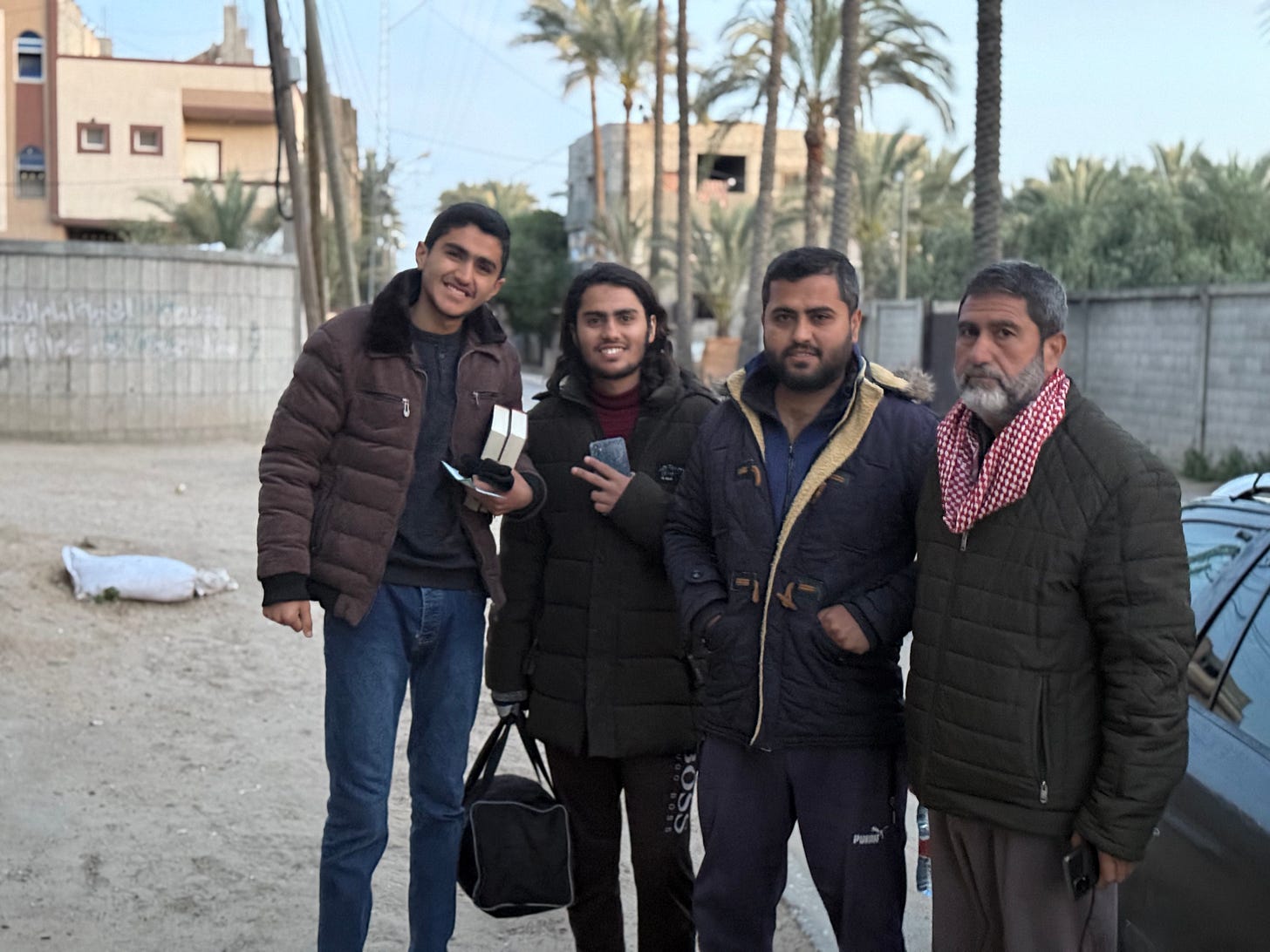
Accidental War Correspondent
Since the onset of Israel’s genocidal war on Gaza, my life has been flipped upside down. My educational career was interrupted. In 2023, I was in my final undergraduate year at university. When the Israeli onslaught escalated, I stopped reporting on football and evolved into an accidental war correspondent—to cover the genocide against me and my people.
With the exception of two periods—a week-long truce in November 2023, and a longer ceasefire this past January that lasted nearly sixty days—the bombs fell perpetually on Gaza. Al-Hassan Mattar, my closest friend, was killed. My aunt’s entire family was wiped out. About twenty relatives were killed in twin bombings that targeted my other aunt's family.
Being immunocompromised, the genocide exacerbated my long-time suffering. I contracted a variety of diseases—acute gastroenteritis, bronchitis, and hepatitis A. At times, I stayed in bed for days. Hardly any food or medication was allowed into Gaza, making it nearly impossible to find the resources necessary for my recovery.
A year ago, a group of volunteers launched a campaign to evacuate students from Gaza to pursue their education abroad. In order to apply for a scholarship overseas, specifically in Europe, they contacted me and enquired about my official paperwork. I sent them my documents and gave my conditional consent: I would depart Gaza, if and only if the genocide came to a halt.
A few weeks later, I was offered a scholarship to study in Ireland. This was about a year ago. In the intervening months, I declined to leave Gaza. With journalists being systematically targeted, the scholarship organizers were concerned about my safety. They begged me to go, but I refused. I didn’t feel I could leave my family or my country behind. I was determined to fight with everything I had. I wanted to give my life for my country, because I felt my voice could change things. I insisted on giving it my all until my very last breath. My homeland needed me more than ever, so I wanted to give it everything. I had several opportunities to leave Gaza, both before and after Israel’s invasion of Rafah in May 2024, but my resolve to stay and make sacrifices for my country neither wavered nor waned.
At the end of March, I was diagnosed with acute malnutrition. For a few weeks, it took a heavy toll on me. Every day was agonizing, beginning with back and knee pain and ending with terrible fatigue and dehydration. Despite this, I continued to document the unspeakable trauma and suffering in Gaza, particularly in my hometown of Deir al-Balah.
I and a few other Palestinian students had received scholarships at Irish universities, and the Irish embassy told us that the trip to leave Gaza would be on April 9, in coordination with the Israeli military and international health agencies. I had one week to decide. They had told me a few days prior that Israel had completed a security review and issued a clearance for me to leave. This eased my family’s distress and my own, since the Israelis had publicly smeared me and essentially placed a target on my back. But, then, the Israelis postponed the departure by another week. I was relieved, because I didn’t want to make such a difficult choice.
When I was told that the departure was confirmed for April 16 and that I needed to make a firm decision, I was put on the spot. I needed to reflect. In all my life, I had never felt so anxious. I quickly sought a solution from the embassy, who understood and appreciated my predicament. I could say, yes, and then wait until the last minute, they advised. This only made the process more difficult. I became consumed by apprehension and confusion, feelings that grew with every passing minute.
Can I Ever Return Again?
"Should I stay or leave?" "How could I abandon my homeland and family?" "This is the first time I will be leaving. How will it feel?” "Will my family be killed? "Why am I leaving?" "Can I ever return again?" "Will I embrace my parents again?" "My room, the courtyard, the trees, my street, and everything around me, will I ever see them again?"
These questions haunted my mind incessantly. I couldn’t turn them off.
I spent a lot of time discussing all of this with my friends, family, and editors overseas. I was unsure of what to do. Every morning, I woke up with even more pain and fragility.
My family and I were afraid that the Israeli soldiers would detain me at the border. That I could be disappeared, like so many Palestinians, into an Israeli prison or worse. Israel had bombed international convoys numerous times during the genocide, so I was also terrified that they would strike our bus. I was genuinely terrified of everything and every option. Up until the morning of April 16, I continued to pray istikhara—a specific prayer in Islam to seek guidance from Allah on important decisions—and implored God to guide me.
On a sunny, blurred, and windy morning on April 15, I was finally guided to a decision, and I informed my family. I spent every single minute with them after that. We posed for more pictures together, ate our okra lunch together, which my mother prepared because she knew I love that the most.
I packed up my belongings. Even though the instructions on what I was allowed to bring did not include them, I decided to bring the pens and notebooks I used when I was learning English during my childhood. I wanted to keep them with me as a reminder of my story, if I made it.
The next morning, I presented my ID to the bus driver and boarded the bus. As we were leaving Gaza, I was eager to commit every view to memory. As directed by the Israeli army, we made two stops along the way. At each stop, the driver was waiting for a call from the Israelis to either continue on our journey, or to make our way back.
On our way, I stared at the utter devastation of every building, especially along Salah al-Din road. I tried to film everything so I could carry some of the pain with me.
The roads were so torn up and damaged that the driver couldn't even clear the street of anything until he had the Israelis' permission to pass. After initially stopping us, they lifted the metal barrier for us. I glanced to the left and right. There were Israeli soldiers everywhere—some wearing sunglasses, others with automatic rifles slung over their shoulders. Nearby, I could see some of them raiding and shooting at homes.
I was seeing Israeli soldiers for the first time. It made my blood boil and my thoughts explode to see these killers—those who had bombed and destroyed my homeland—up close and directly in front of my eyes. I had the impulse to jump off the bus and confront them. There were tanks stationed on either side of the road. Ahead of us, an Apache helicopter was flying at a low altitude.
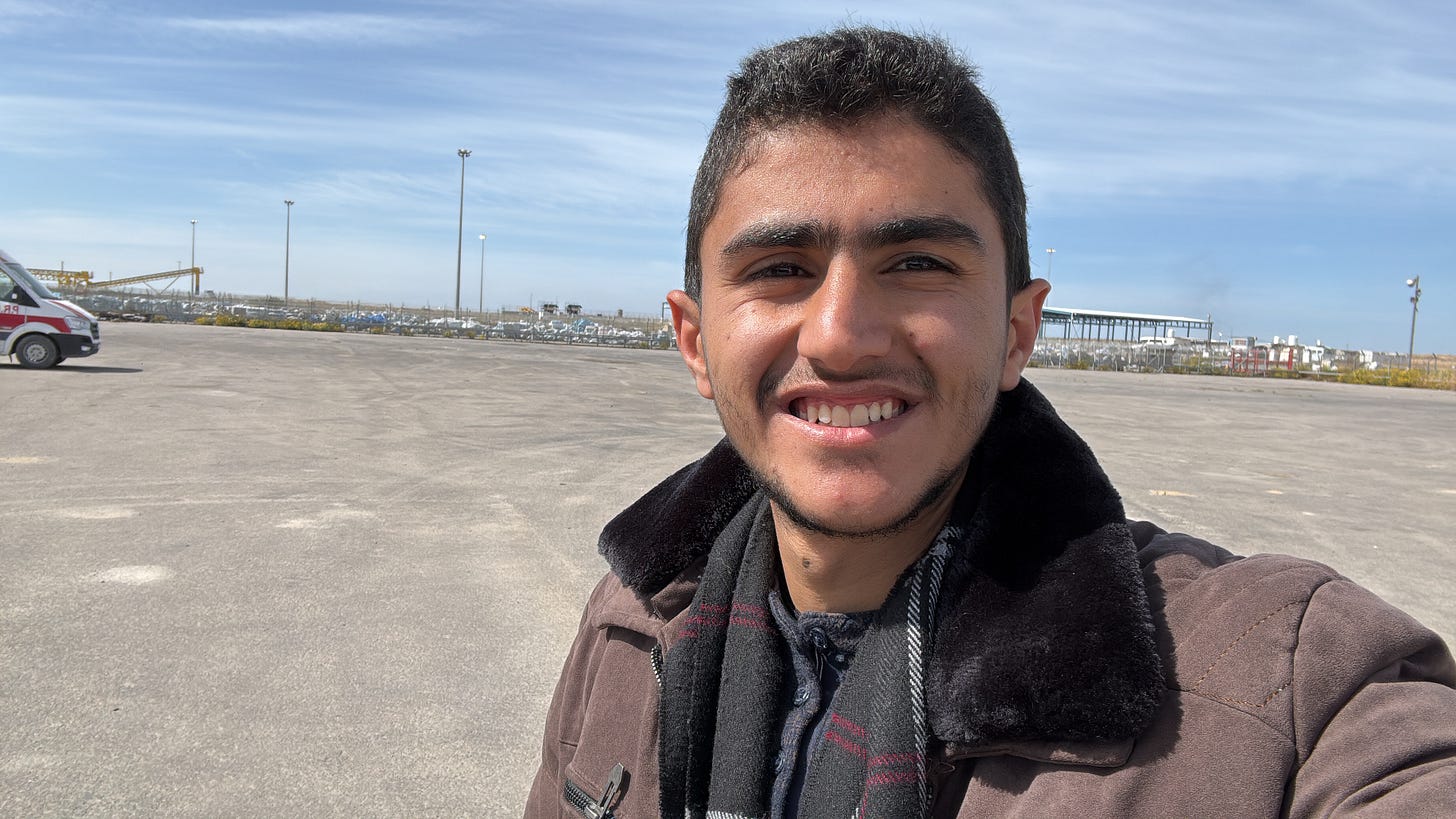
As we passed, Rafah's residential buildings were still being obliterated. When we got to the Palestinian side of the Karm Abu Salem Crossing, we saw that a lot of aid—especially water bottles—had been discarded and food left to rot. It was excruciating to witness. Every time the bus moved forward and I saw more, my blood would again boil.
We got off the bus. After around three hours of standing and waiting, we had a brief identity check. The Palestinian staff at the crossing were kind and generous with us. After that, we passed to the Israeli side where an Israeli soldier watched my every move. I was genuinely scared. I was ordered to put all my belongings in a large bin and hand it over.
After standing before a camera and body scanner, the bin was eventually handed back to me. A Palestinian worker told me they had confiscated my phone charger, flask, and some clothing, and he promised to try to get them back for me. I chose to keep moving and approached the next security check.
Sitting in uniform around a table with a laptop and an M16 slung across his shoulder, an Israeli officer was checking IDs and personal papers. We were told to wait in an area that had Israeli flags emblazoned on the walls and ceiling.
With a pounding heart, I approached the officer and handed him my ID. He held it up in line with my face and stared at both momentarily. After entering my information on the laptop and making a call, he gazed at my face once more. He then asked me to wait while he put a red wristband on me with a number on it: 352753. Since my group had departed, I asked him if I could join them. "No," he responded. When I asked again, he told me to sit on a chair and wait.
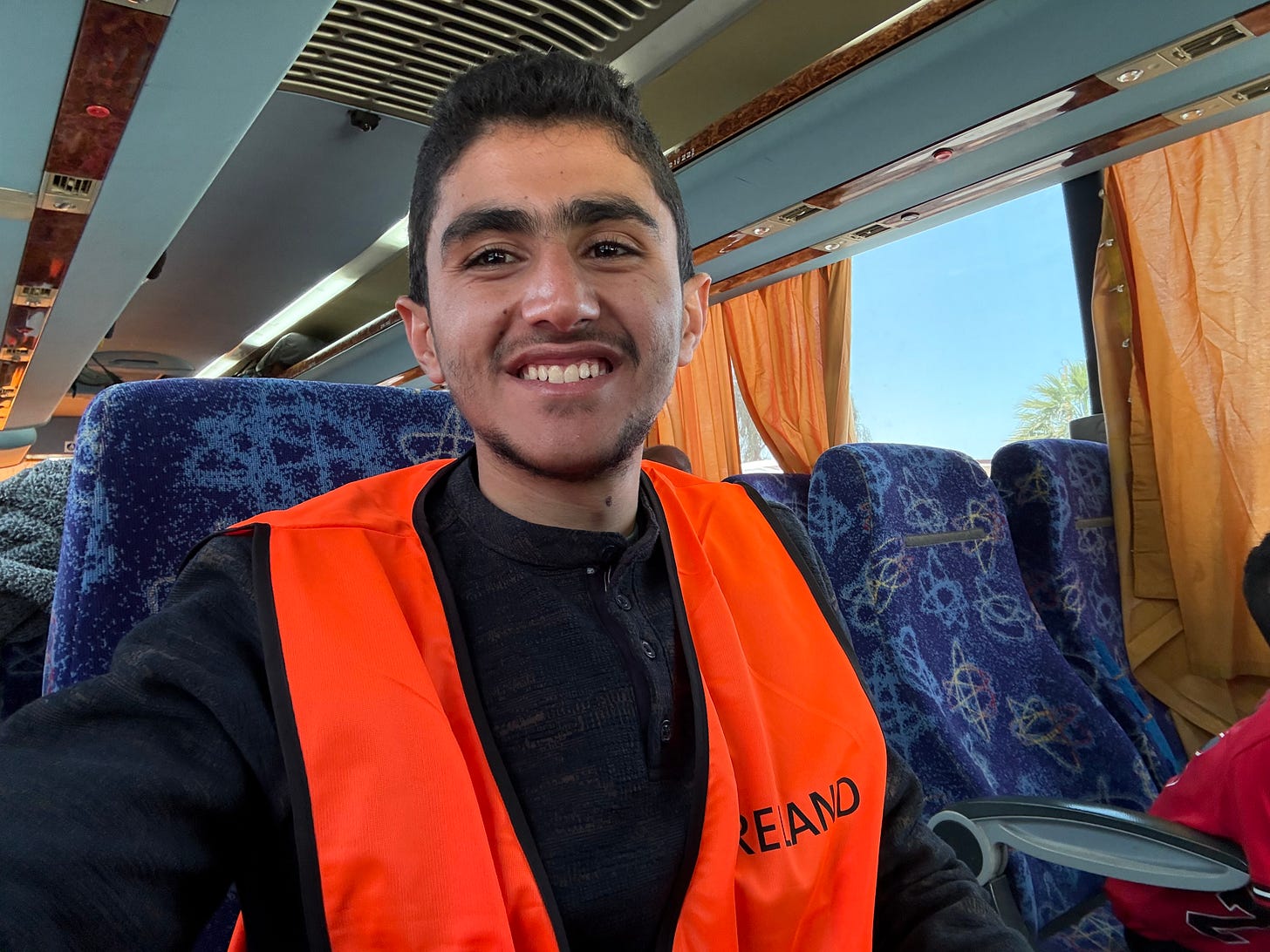
I stared at him—and the surrounding Israeli flags—with a mixture of pain and fury. After about twenty minutes, he let me through. I then proceeded to an area where a number of buses flying various European flags, including the Irish embassy bus, were waiting for us outside the border. Two Israeli officers in a police car escorted our bus all the way to the King Hussein Bridge, where we were inspected again, first by Israeli officials then Jordanian ones after crossing into Jordan.
All of Palestine
The first thing I saw outside of Gaza was the rest of occupied Palestine—something I had never dreamed of seeing in my life. We drove past signs to Jerusalem, the Dead Sea, Yaffa, Haifa, and Jericho. I sorrowfully watched my homeland pass in front of me—unable to visit—while I witnessed settlers taking their pleasure from our land. It pained my heart deeply. The most breathtaking sights I have ever seen in my life were the salty, historic buildings and hills surrounding the Dead Sea, the vast green stretches of palm trees, and the gorgeous yellow dates. My life’s dream was to be able to travel across all of Palestine.
But I only got a brief glimpse of it, before we crossed the border into Jordan. From there, we headed to Amman where we would spend the night in a hotel and leave the following evening from Queen Alia Airport to fly to Dublin with a layover in Istanbul.
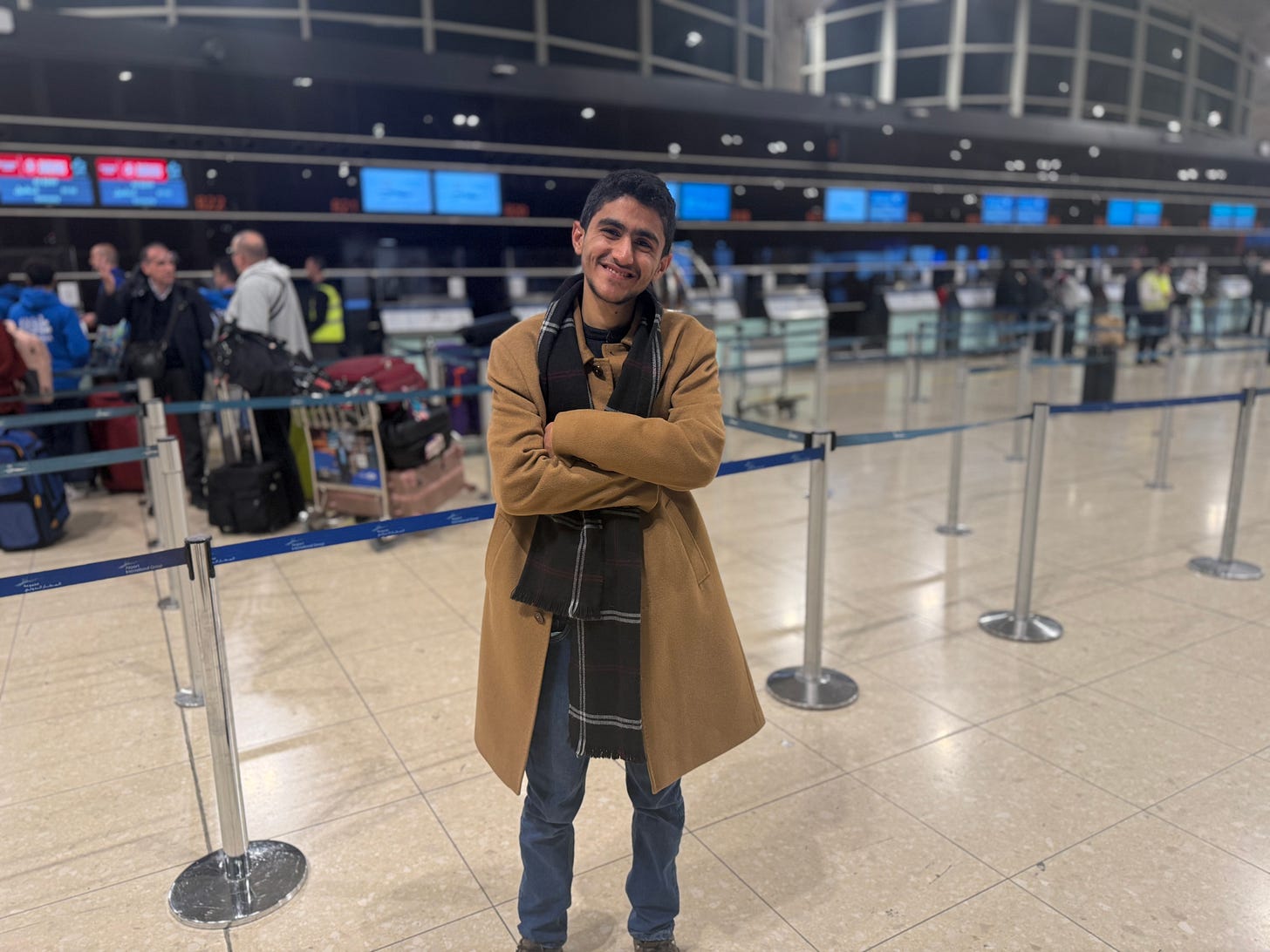
The first meal I had in Jordan was a shawarma. Tears welled up in my eyes as I unwrapped it: I was amazed that I had so much food. Every taste brought back memories of my family and the days before the genocide. I couldn’t enjoy the food at all. I needed to eat to restore my health, but I had no appetite. It hurt me physically to eat such a rich meal after being starved for so long. I had awful stomach pain. The most heartbreaking thing I saw after I left Gaza was people going about their daily lives and eating, while my family and my people back home were starving.
For the first time in nearly 560 days, I also received the care and prescription drugs I had sorely needed for months. They were two very basic medications: a multivitamin and an antibiotic. Nothing more.
At the airport the following evening, we headed to the gate to board the flight. Planes are a source of fear to me—the only ones I had ever seen before were warplanes. I was seated by the window next to a very kind and pleasant Palestinian-American woman who was traveling from Amman to the US. I stared at the wing of the plane and turned to ask her whether the large turbines attached to the bottom of the wing were missiles. “No, that’s the engine,” she replied.
She had flown many times before and taught me all I needed to know about the experience. Once in the air, I looked out the window and took in the earth below with wonder; it helped me for a moment to forget my homesickness and anguish.
We arrived in Dublin on the morning of April 18 after a full day of travel. As the plane descended, I noticed that everything was covered in trees and fields of green. Despite the rain, it was beautiful to fly in the clouds.
We landed, went through passport control, and picked up our purple suitcases. I walked into the arrivals hall and saw my friends, my college program director, and two of my editors. I hugged Jeremy Scahill, my colleague from Drop Site, and greeted Anealla Safdar, my editor at Al Jazeera English. I stayed with them all day and into the night.
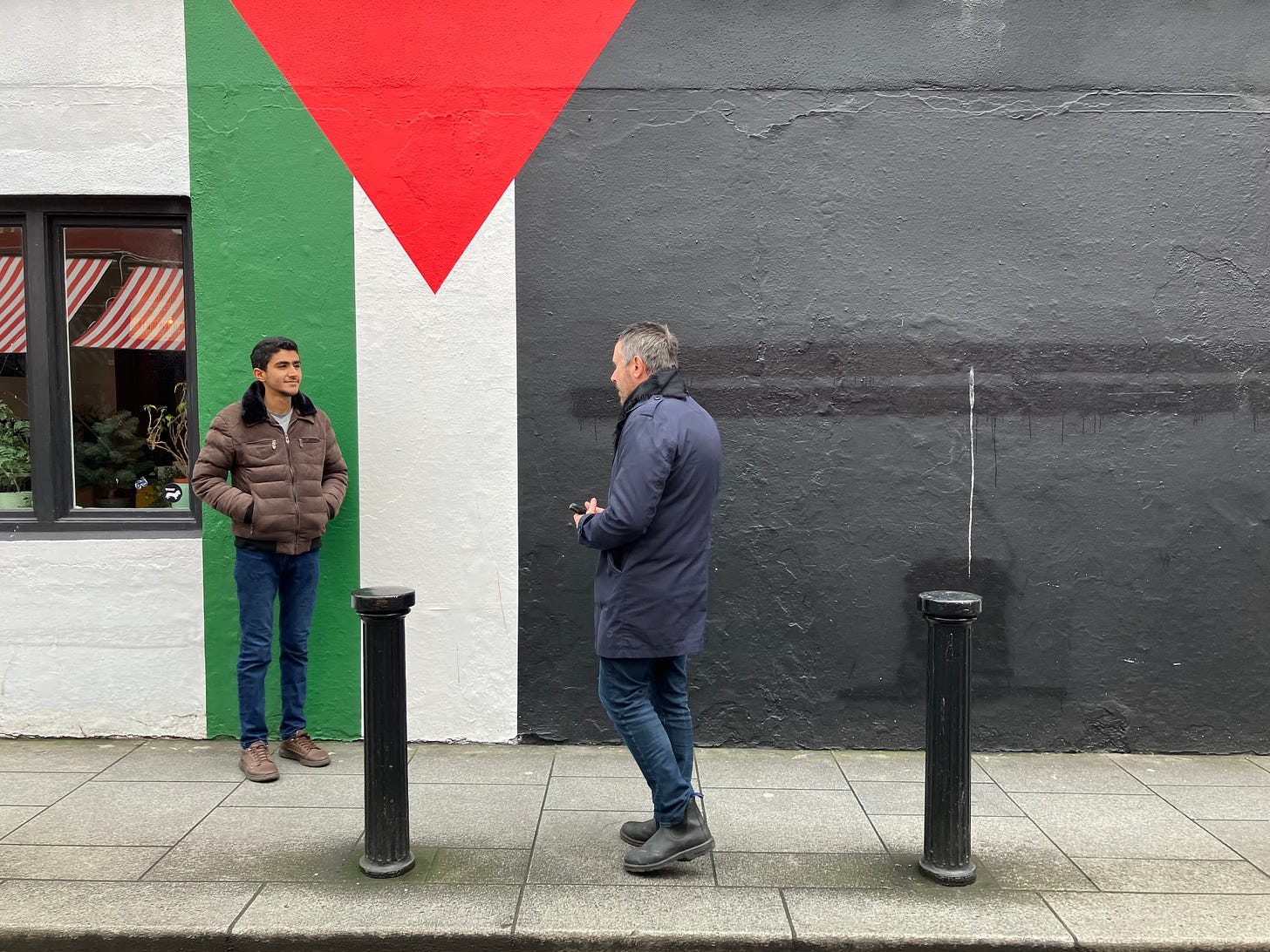
We went to the hospital for a medical checkup. I was given a small bottle of water. I took a sip, and I was amazed at how pure it was. I felt tears in my eyes and told my editors and the people around me that I was in shock. I will never forget the contaminated water I drank in Gaza. Just days before I left, I was digging wells near my home to look for water. I drank this bottled water with remorse, but it made me feel better. I felt as though I had been transported from hell to heaven. In the days that followed, we ate a range of dishes that I never would have imagined.
For nearly 560 days, already turned upside-down, my life had also been turned inside-out. I survived multiple Israeli attacks during my reporting. I reported things that were unspeakable to witness. Despite all the anguish and trauma, I continued. I wrote dozens of stories of suffering and tragedy. I wrote about the destruction of sports in Gaza, my passion. I wrote about the murder of my dearest friend Al-Hassan Mattar and about the immolation of Sha'ban Al-Dalou as he slept in a medical tent outside a hospital.
Reporting a Genocide
Reporting a genocide of your own people involves much more than just journalism. It means combining your suffering with that of others. I spent hours charging my damaged equipment in order to write. I trekked kilometers to get an internet connection to file a story, or sent my copy as WhatsApp messages during the horrors of the night. Each day was a new trauma.
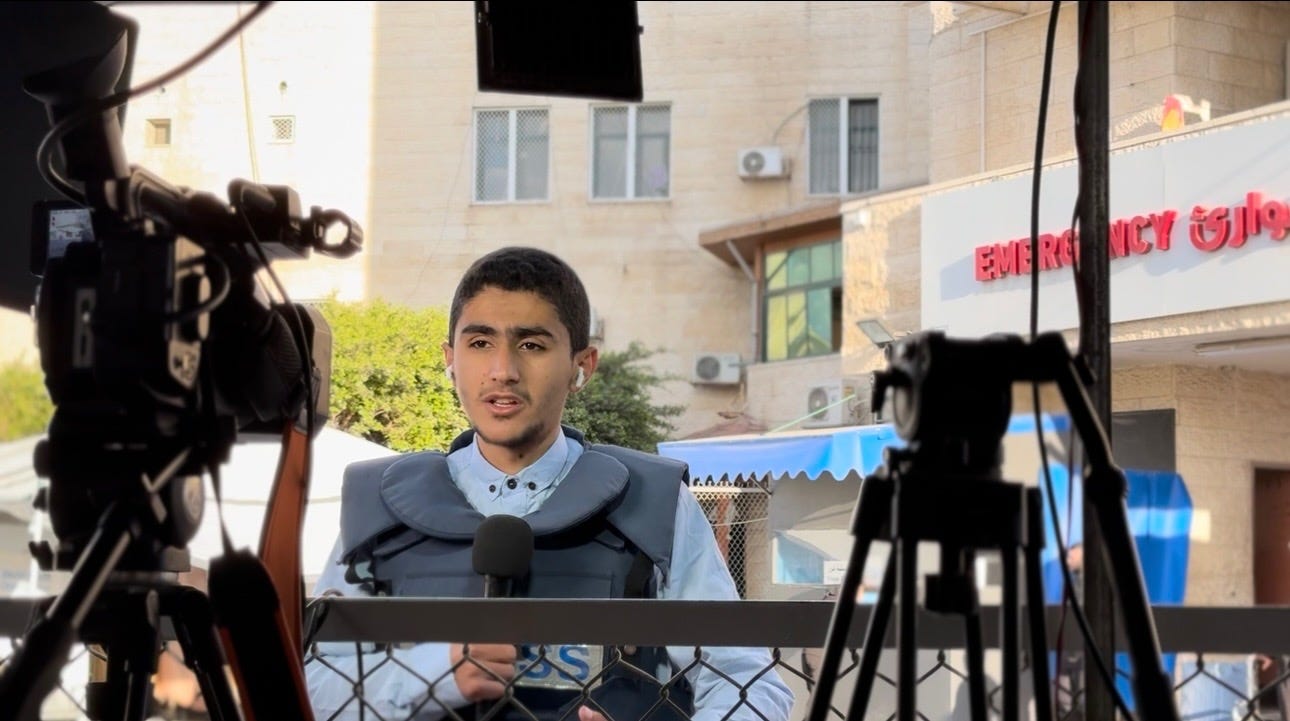
I was 20 when I began reporting on the genocide. Now, I am 22. My hope is to be free—to be like any 22-year-old around the world. I was a football reporter who had to evolve into a war correspondent, and I kept speaking the truth at the top of my lungs and sharing our tragedies with a world that has let us down for the last eighteen months.
My journey has been difficult. I was born in a womb of suffering, raised in a walled-in refugee camp, and I faced countless struggles and challenges. I grew up with war. I spent many nights in the dark with no light except for a candle whose wax would melt and sting my hands as I wrote.
Gaza was always a place of suffering—the genocide thrust us to a lower rung of hell than the one we had always lived in. From the time the siege was imposed, the nightmare never ceased. It only got worse.
I love the English language and I wanted to address the whole world, so I kept reporting until I became the person who is filing the story you’re reading now from abroad and who cried many times to write it. Over the years, I was offered a variety of scholarships around the world, mainly in the U.S., but I was denied by the siege and occupation. Our only reliefs were the sea, the stadiums, and a few restaurants. Israel never wanted us to feel joy in Gaza but, somehow, we found the will to defy this. Gaza is a concentrated kill zone where some two million people are trapped, yet our people are resilient. This is also why I refuse to abandon my smile. It is my quiet act of rebellion.
I adore my country and wish I could have remained there forever. I never wanted to hurt my family. My body let me down. My family and I shared the belief that Israel was pursuing me and that my death was imminent. If it weren't for my mother's extremely hurtful remarks, I wouldn't have left. Maybe that’s why she said it—to make me go. My family, especially my parents, are more important to me than my personal safety.
The sorrow in my heart after seeing my occupied Palestine is unmatched. I don’t want to live in this terror. I want to break the borders down and live as freely as anyone in the world. I will die for the moment that Palestine is free. Palestine depends on us. Our land will bloom with our blood. I am here to die for its liberation. I’ll keep writing, expressing our cause everywhere, and raising awareness until every inch of Palestine is free.
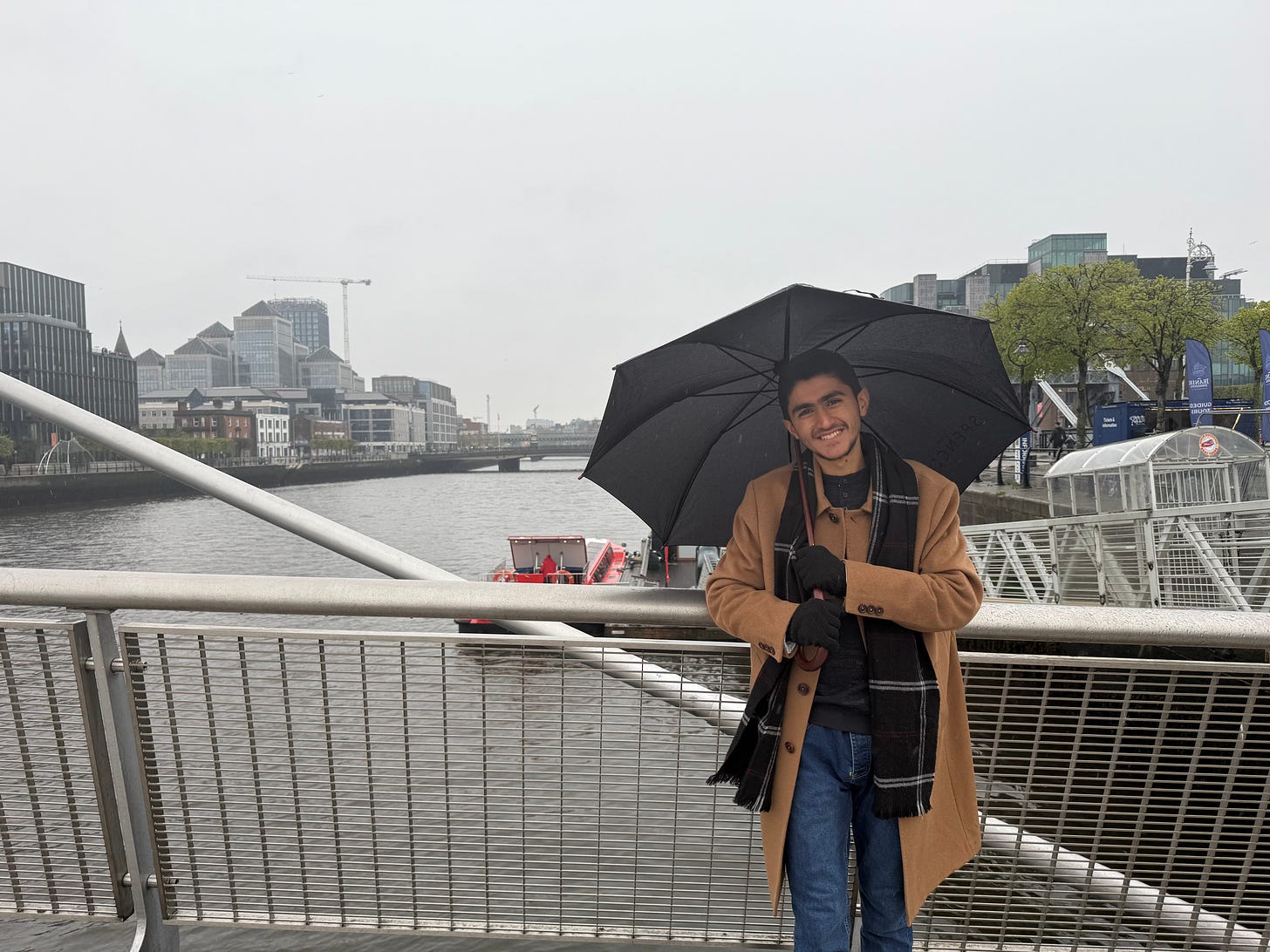
I will never forget the kindness of the Irish embassy, which prioritized my safety and provided me with all I needed. Ireland feels like home right now; it’s Palestine in another part of the world.
Outside of Gaza, I will fight with all my strength to change the world—to continue speaking up until the genocide ends. It must end. Now.




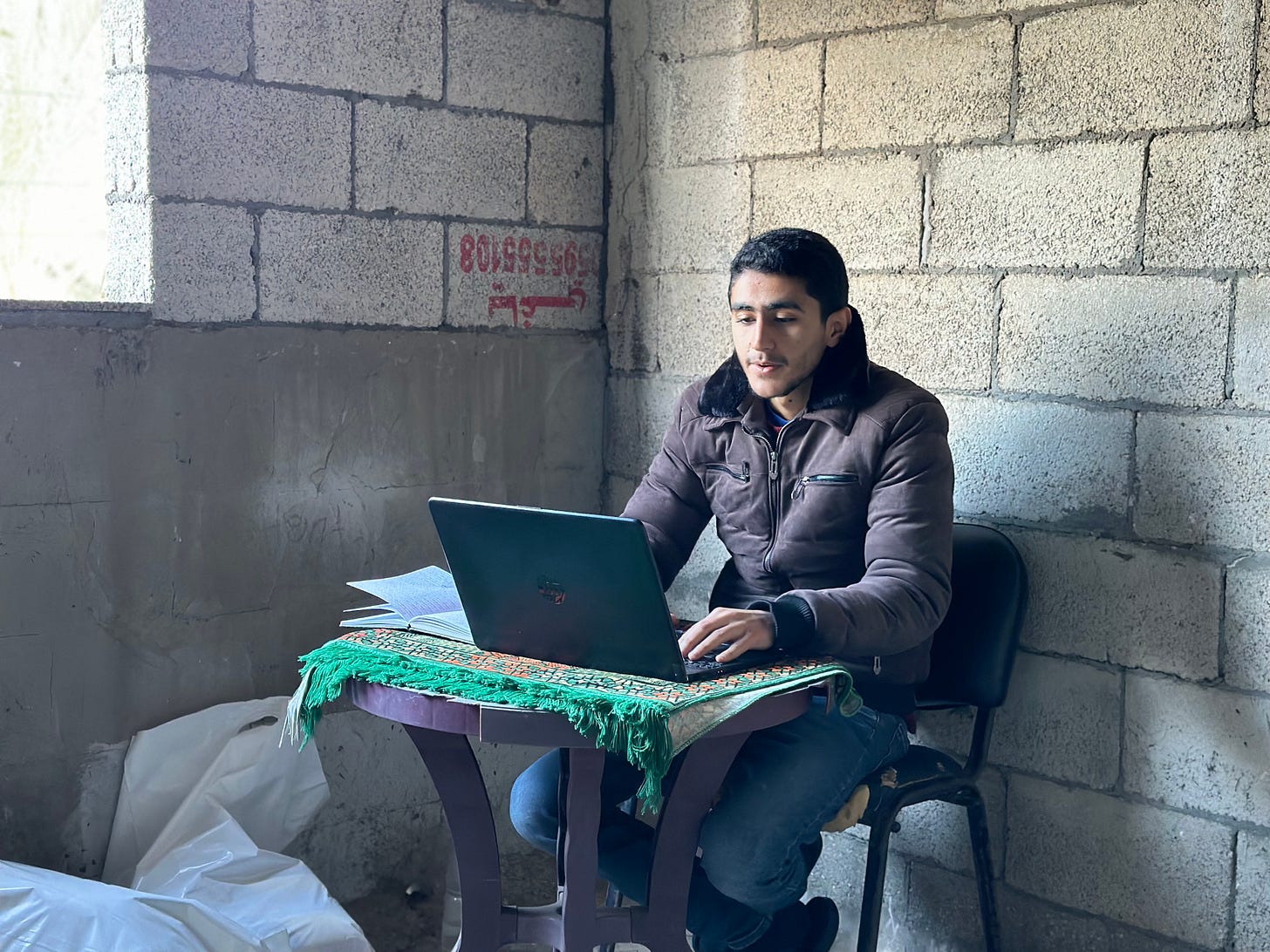

Solidarity with you and all Palestinians who have been forced into unimaginable horror in their own land. I truly cannot imagine how difficult this is for you to leave your homeland and family. The reporting of you and all the brave Palestinian journalists who show the truth of the genocide by the zionist entity all while having a target on your back cannot be put into words. The western press who has manufactured consent for this genocide is shamed by the courageousness of Palestinian journalists who risk their whole existence to report on the genocide of their people.
Love and solidarity with you Abubaker and all the Palestinian people. Your reporting is a light shining in the darkness of western colonialism and imperialism.
So glad to see you are safe. We need your voice!